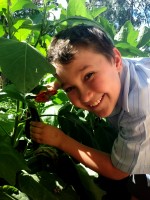
|
Sustainability@Donvale
About the Program
Carey Donvale has been a leading school in Sustainability Education since becoming one of the first 5 Star Sustainable Schools in 2003.
The Year 4 Environmental program — Sustainability@Donvale — develops the knowledge, skills, values and world views necessary for students to live more sustainable lives, aiming towards ensuring there is enough for everyone, forever. Students develop an understanding of broad concepts, such as climate change, the enhanced greenhouse effect and how humans have contributed to these global issues. Students engage in a variety of excursions and practical activities on campus to further enrich their understanding. As the Enviro Leaders at Donvale, Year 4 students are key in educating the School about sustainable practices and initiatives through classroom presentations and assembly items.
Research on the implications of contact with nature on student health, wellbeing and development support our School’s sustainability activities and show that time spent in nature helps students to thrive as individuals — physically, intellectually, emotionally, mentally and ethically.
Throughout the year, students experience the positive emotions and accomplishment that come from growing and cooking their own vegetables and herbs. This enables them to develop an understanding of healthy eating, how their food is grown, where their food comes from, the processing involved, food wastage and the packaging options chosen by supermarkets. Students explore Fairtrade products, including chocolate, clothing and sporting goods, as well as food miles and the impact of transporting food around the world compared to buying locally.
The year begins with a focus on waste and the systems used by the community, our School and at home to process both organic and inorganic waste. Students prepare compost from fruit and vegetable scraps collected from our classrooms, using composting bins, tumblers, Green Cones and cannons within the vegetable garden. They also learn about worm farming and how Green Cone waste digesters operate differently to compost bins by liquefying food waste and feeding the surrounding plants. Students investigate the properties of different materials and consider the role of non-recyclable materials in our lives. They learn about the Great Pacific Garbage Patch and the role plastic is playing in degrading our environment, and practical actions they can take.
Students investigate native and indigenous plants and how to propagate plants from cuttings. Throughout the year they nurture their plants in preparation for planting on campus. The students enjoy many cross age sessions with children from our Early Learning Centre, including planting and sharing their knowledge. The School works in strong association with Manningham Council, contributing to the local environment and community.
Towards the end of the year students participate in the Green Lane Diary home task where they complete an environmental action each day for the term, before reflecting on the sustainable practices they have made habit through completion of the task. They research non-renewable and renewable resources, the impact fossil fuels have on the environment and the processes involved in generating energy. Students conduct audits of energy use in the School and make recommendations for improvement. Using this knowledge, they then design, construct, test, modify and evaluate a hydrogen fuel cell car, produced with recyclable materials.
|

